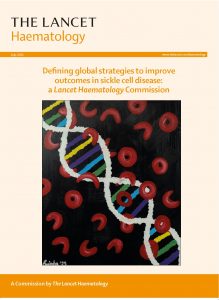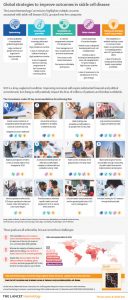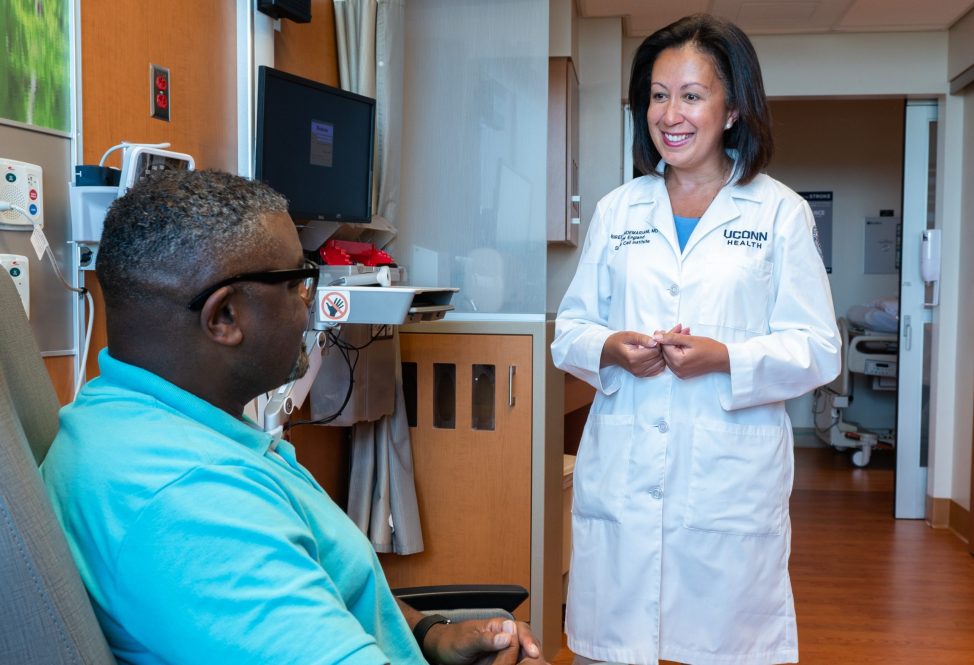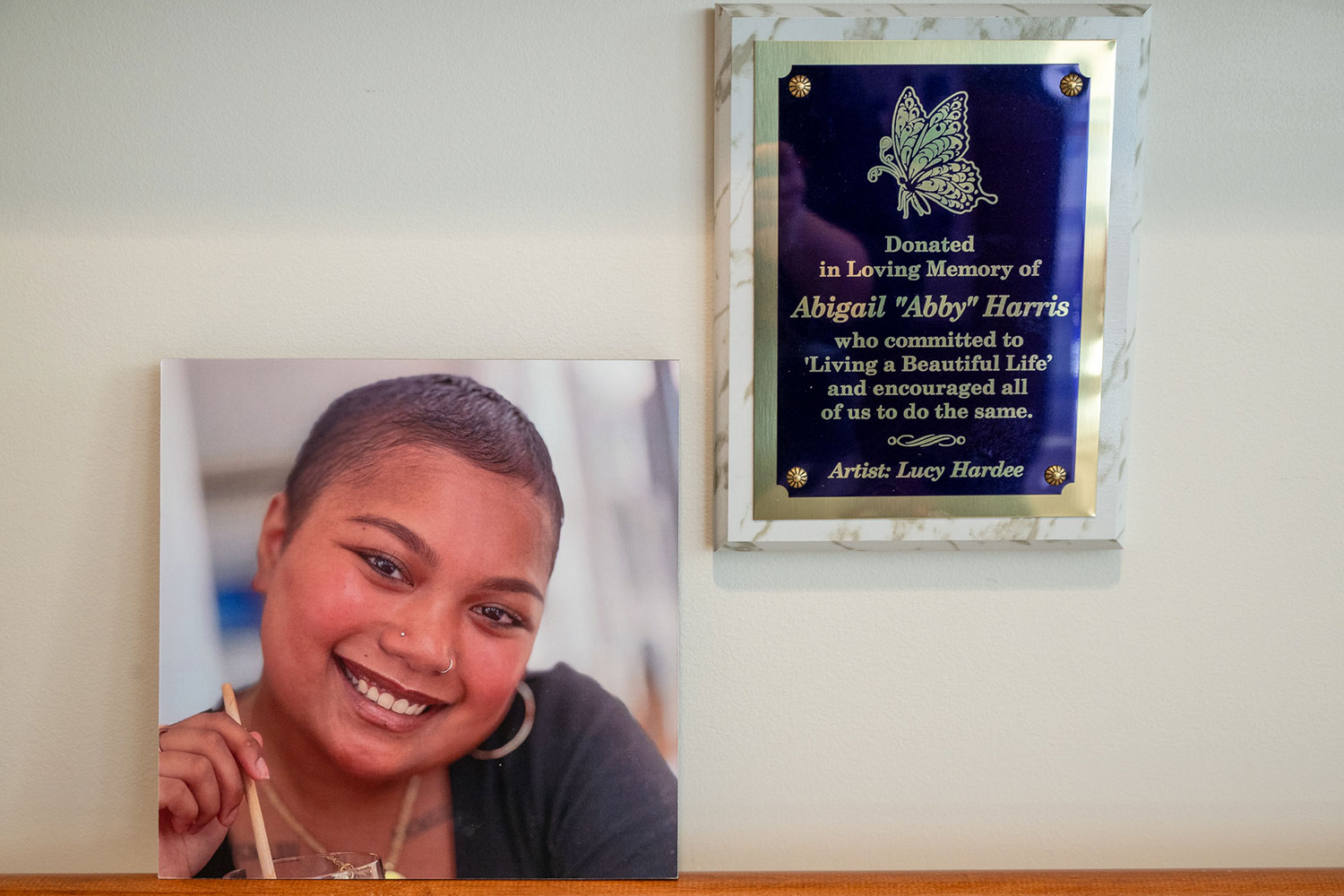Dr. Biree Andemariam, director of the New England Sickle Cell Institute at UConn Health, is part of a new Commission published in The Lancet Haematology journal on July 11 by sickle cell disease experts from around the world.
 “I am honored to have been a member of this Commission of global experts on sickle cell disease and commend the Lancet for giving us the worldwide platform to disseminate recommendations on simple and effective methods that can be implemented to reduce the pain and suffering of millions of individuals living with sickle cell disease,” says Andemariam who cares for sickle cell disease patients in Connecticut at UConn John Dempsey Hospital while also advancing research with clinical trials.
“I am honored to have been a member of this Commission of global experts on sickle cell disease and commend the Lancet for giving us the worldwide platform to disseminate recommendations on simple and effective methods that can be implemented to reduce the pain and suffering of millions of individuals living with sickle cell disease,” says Andemariam who cares for sickle cell disease patients in Connecticut at UConn John Dempsey Hospital while also advancing research with clinical trials.
Over half a million babies were born with sickle cell disease in 2021. A recent study also in The Lancet Haematology journal provided the first estimates of the full global mortality burden of sickle cell, revealing a strikingly high contribution of sickle cell to all-cause mortality that is not apparent when each death is assigned to only a single cause. The study suggests there were 376,000 global sickle cell-related deaths in 2021, compared to the only 34,400 cause-specific deaths. The study shows global mortality burden from sickle cell disease may be nearly 11 times higher than recorded.
Andemariam adds: “In the published report, we highlight the seriousness of the global burden of sickle cell disease and the inequalities in diagnosis and basic clinical care.”
According to the Commission of global experts reducing the burden of sickle cell disease requires substantial financial and political commitment to improving data-collection, diagnosis, treatment and training.
“The commission gives succinct recommendations on how countries can mobilize at all levels—government, health system, community– to improve health outcomes within short and realistic timeframes,” says Andemariam to positively impact the lives of millions of patients and families living with sickle cell disease worldwide.
“The number of deaths due to sickle cell disease is increasing globally,” says Dr Frédéric Piel of the Imperial College London who chaired the Commission. “The changes identified in our Commission are achievable and will improve the lives of people with sickle cell disease throughout the world.”
For example, the Commission highlights how newborn screening for sickle cell disease can lead to babies with the disease receiving life-changing treatment before symptoms develop and calls for all babies worldwide to be tested for sickle cell disease by 2025 to prevent long-term complications of the disease.

The Commission also shines a light on the inequitable treatment of sickle cell disease globally as well as a lack of clinical trials aimed at developing novel treatments. The Commission says that in the context of increasing global inequalities, partly driven by racism, previous calls for action on sickle cell have been largely ineffective. There is an urgent need for all people with sickle cell to be given access to minimum specific health care no matter where they live and for funding programs for research in all aspects of the disease to be prioritized and increased.
Health care disparities experienced by sickle cell disease patients is something Andemariam witnessed first-hand in the United States. When she arrived to UConn Health in 2007 she noticed a recurring patient care pattern. Sickle cell patients would come to the Emergency Department with repeated episodes of severe pain and experience prolonged hospital stays.
“I knew I could do something about this,” said Andemariam and her dream of helping sickle cell patients came true at UConn.
In 2009, she established at UConn Health the New England Sickle Cell Institute. It is the first and only dedicated outpatient regional center of its kind for managing the painful inherited red blood cell condition to help adults combat the daily suffering associated with sickle cell disease and improve their overall quality of life. Andemariam and her team have also worked to identify more sickle cell patients in the surrounding communities to help them better manage their health, reduce their pain symptoms and disease complication risks, and to keep them out of the hospital so they could enjoy their lives more.
Andemariam, also a professor of medicine at UConn School of Medicine, and her Institute have been transforming the lives of sickle cell patients. The once small program now serves hundreds of patients, and as a national referral base. Her global collaborations have published evidence-based, best practice guidelines, and her research team is conducting clinical trial testing for promising experimental drugs aimed at reducing the disease’s trademark cell sickling, blood vessel blockages, organ damage, frequent hospitalizations, and premature deaths.
Read the new Commission on sickle cell disease report.



